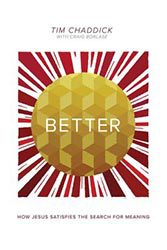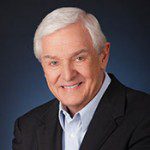“Vanity of vanities, says the Preacher, vanity of vanities! All is vanity.” — Ecclesiastes 1:2
 Reality LA church founder Tim Chaddick begins his first book, Better, with this quote on vanity from Ecclesiastes, followed by the sentence: “Life not working out the way I thought it would turned out to be the best thing that ever happened to me.” Weaving his own personal stories of his journey to faith with the ancient words of the “Preacher” in Ecclesiastes, Chaddick explores the hard questions and serious doubts we all face in searching for the deeper meaning of our lives and how ultimately, Jesus satisfies this search like nothing else can.
Reality LA church founder Tim Chaddick begins his first book, Better, with this quote on vanity from Ecclesiastes, followed by the sentence: “Life not working out the way I thought it would turned out to be the best thing that ever happened to me.” Weaving his own personal stories of his journey to faith with the ancient words of the “Preacher” in Ecclesiastes, Chaddick explores the hard questions and serious doubts we all face in searching for the deeper meaning of our lives and how ultimately, Jesus satisfies this search like nothing else can.
We invited Chaddick to respond to some questions about his new book, his own journey toward the “better life,” and what he hopes people will take away from Better.
What inspired you to write Better, and why did you choose the book of Ecclesiastes as the focus?
 Ecclesiastes was one of the first books of the Bible that I read when I was a new Christian. I loved it. The topics and themes it addresses resonated so much with me because it describes life without God or life with a distant God, which is what I experienced before I came to faith. Ecclesiastes helps us take a very honest look at life without the lens of faith so that we might appreciate the life of faith. Now, years later, these themes have become especially relevant to the church and the city in which I pastor. In a city that is driven by ambition and the search for meaning and purpose, this book asks “What are we living for? Where will it lead? What if we are wrong?” These questions set us up to see how Jesus actually changes everything about our lives.
Ecclesiastes was one of the first books of the Bible that I read when I was a new Christian. I loved it. The topics and themes it addresses resonated so much with me because it describes life without God or life with a distant God, which is what I experienced before I came to faith. Ecclesiastes helps us take a very honest look at life without the lens of faith so that we might appreciate the life of faith. Now, years later, these themes have become especially relevant to the church and the city in which I pastor. In a city that is driven by ambition and the search for meaning and purpose, this book asks “What are we living for? Where will it lead? What if we are wrong?” These questions set us up to see how Jesus actually changes everything about our lives.
The title of your book is drawn from words from Ecclesiastes … how did you come up with the title, and what does it mean for you?
The “preacher,” as the author calls himself, is always on the search for what is better, and so are we. The Hebrew version of that word is used more times in Ecclesiastes than any other Old Testament book. He is looking for what is better in every area of life. This is how most of us are living. “What is better? What does better actually look like?” are the questions I’m asking in my book, in order to show how the questions of the human heart are only and ultimately answered in the person of Jesus.
Who did you write this book for, and what do you hope they’ll take away from it?
I am writing to the Christian who has not yet wrestled with the tough questions that life throws their way. These questions have been asked before in the very Bibles that they own. There is a lot of superficial living within the church today, due in part to that fact that the church hasn’t wrestled with many of the difficult themes in life, causing them to treat Jesus almost as a sort of commodity that they add to life rather than a whole new way of living life. Ecclesiastes blows our cover. I am also writing for the non-Christian. While this is in no way an “apologetic” book of sorts, I am seeking to challenge some of the common assumptions about meaning in life and show them how true and great Jesus actually is and how life is ultimately meaningless if Jesus has not come.
Another important word from your book is “vanity.” You live and pastor in Hollywood, where that word is writ large, but I imagine you see it as an issue we all struggle with, wherever we live…
Vanity could certainly characterize L.A., but it could also characterize every city in the world, just with a different flavor. It’s a word that describes transience, absurdity and meaninglessness; and there is plenty of that to go around the globe. That is actually one of the things I point out in the book: Ecclesiastes looks at life from various angles, whether it’s chasing pleasure or trying to be a good religious person — these themes are addressed throughout. Certain topics will resonate with some people more than others, but we all inevitably deal with them all.
You say your own story had a little something to do with vanities! Tell us a little bit about your own journey, and how you became a Christian pastor.
Though at the time I didn’t have a word like Vanity to describe it, I certainly came face to face with meaninglessness in my own life. All of my cherished expectations about life, which in the book I refer to as a “script”, were continually met with frustration and disappointment. I realized later that God himself was causing me to become aware of the vanity of “life under the sun” so that I might look above the sun, to God who alone gives life. From that point on, when I put my faith in Christ, I couldn’t stop talking about it to the people around me. I soon left the San Francisco Bay Area, where I grew up, to attend a Bible College in southern California. I was not seeking a formal theological education per se, I just wanted to know more about Jesus, more about the Bible, and more about how to communicate both to the world. It was during that time that I developed a very specific desire to preach, which eventually led me to pastoral ministry. In 2006 my wife and I moved to L.A. to start a church with that very purpose: to show Jesus to be the remedy for all that is wrong and all that is missing in our city.
You say the writer of Ecclesiastes is a “Question Maker.” What do you mean by that?
Some people have the gift asking good questions. The “preacher” of Ecclesiastes is one of those people. A “Question Maker” demands that you look more closely at what is often hidden in plain sight. I saw the phrase used about an artist in Time magazine a while back who saw his role in society as someone who helps people look at truths they might be uncomfortable with. In the book I call it “sacred skepticism”, which asks hard question about life, ones that we often avoid in fear. As a Christian, I am used to being asked hard questions about faith, but Ecclesiastes turns these hard questions back on those without faith, or those who view it as an optional extra. Raising the questions you aren’t asking is what a “question maker” does.
What is the connection between the Preacher of Ecclesiastes and the Preacher- King who comes much later — Jesus? What do they have to do with each other –- and us?
The author of Ecclesiastes is a ruler in Israel who is “preaching” the dif/icult truths of life under sun but who can only take us so far. He himself does not have all the answers. So, as Professor Peter Kreeft once said, “Ecclesiastes is the question to which the rest of Scripture is the answer”. The tough truths of the book set us up to receive the greatest answers of all, which are found in the true King who preaches the greatest message the world has ever known. For this reason we can read Ecclesiastes without fear, for the moment we hit a dead-‐end in life under the sun is the same moment we can turn and look above the sun to Jesus who brings the meaning, purpose, satisfaction and forgiveness we need.
What are some of your favorite verses/sayings from Ecclesiastes?
Some of my favorite sayings are the more scandalous ones like Eccl. 10:19: “Bread is made for laughter, and wine gladdens life, and money answers everything.” Why in the world is this in the Bible? He is looking at life from different perspectives before coming to a conclusion. There are times that life seems to be all about food and drink, until you realize that it doesn’t satisfy as the meaning in life, until you realize it doesn’t deal with the big problems of life like death.
Some of my other favorite sayings are the sobering ones like Eccl. 7:2: “It is better to go to the house of mourning than to go to the house of feasting, for this is the end of all mankind, and the living will lay it to heart”. We need statements like these because If we don’t take things like death seriously, then we won’t take life seriously.
What words would you like to offer someone who feels that life is not going according to plan? How do we start walking toward the “better” for our lives, now?
I would simply and gently start by asking where your plan came from in the first place? It may be that our expectations have been shaped by the wrong things. Saying this doesn’t need destroy you. In fact, these questions and statements are the first step to discovering a much a greater plan: the one that God has for us through the gospel, the one He has revealed in the Scriptures. It is only here that we find a vision of life that is neither naïve nor cynical, but realistic and hopeful. When Jesus is believed on as Savior and source of your life, then nothing, not even death, can have the last word. He does. And that is good news.
For more conversation on Better – and to read a book excerpt – visit the Patheos Book Club here.













